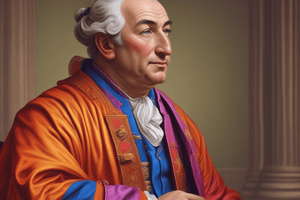Podcast
Questions and Answers
What was a significant focus of thinkers during the Enlightenment?
What was a significant focus of thinkers during the Enlightenment?
- The rejection of all forms of government
- The exploration of supernatural phenomena
- The workings of the human mind and knowledge acquisition (correct)
- The reestablishment of ancient religious doctrines
Which philosopher is associated with the idea that knowledge is gained through experience?
Which philosopher is associated with the idea that knowledge is gained through experience?
- John Locke
- Thomas Hobbes
- Immanuel Kant
- David Hume (correct)
What are the two forms of knowledge acquisition as mentioned in the content?
What are the two forms of knowledge acquisition as mentioned in the content?
- Innate and learned
- Practical and abstract
- Sensation and reflection (correct)
- Empirical and theoretical
What term is used to describe the state of being born with a blank slate in relation to knowledge?
What term is used to describe the state of being born with a blank slate in relation to knowledge?
How did David Hume's views on faith change during his education?
How did David Hume's views on faith change during his education?
According to the content, objects are experienced through which capability of the mind?
According to the content, objects are experienced through which capability of the mind?
What does the term 'praiseworthy virtue' refer to in the context of the content?
What does the term 'praiseworthy virtue' refer to in the context of the content?
What is meant by 'posteriori' knowledge as discussed in the content?
What is meant by 'posteriori' knowledge as discussed in the content?
What is the initial stage of the development of the self according to Mead?
What is the initial stage of the development of the self according to Mead?
At what ages does the Play Stage occur in a child's development?
At what ages does the Play Stage occur in a child's development?
How does children’s understanding of communication symbols develop?
How does children’s understanding of communication symbols develop?
What skill is important for socialization during the Play Stage?
What skill is important for socialization during the Play Stage?
What is Locke's stance on personal identity?
What is Locke's stance on personal identity?
What is a significant development in the Game Stage?
What is a significant development in the Game Stage?
What led Immanuel Kant to develop his philosophical ideas?
What led Immanuel Kant to develop his philosophical ideas?
What does role-taking involve according to Mead's theory?
What does role-taking involve according to Mead's theory?
Which of the following best describes the two types of perceptions according to the content?
Which of the following best describes the two types of perceptions according to the content?
When does the Game Stage typically begin in a child's development?
When does the Game Stage typically begin in a child's development?
What is one consequence of children engaging in role play during the Play Stage?
What is one consequence of children engaging in role play during the Play Stage?
What does skepticism refer to in Kant's philosophy?
What does skepticism refer to in Kant's philosophy?
How does Kant's view of the mind differ from a passive interpretation?
How does Kant's view of the mind differ from a passive interpretation?
Which book is NOT written by Immanuel Kant?
Which book is NOT written by Immanuel Kant?
What transformation did Kant experience in his philosophical outlook?
What transformation did Kant experience in his philosophical outlook?
What role do impressions play in human cognition according to Kant?
What role do impressions play in human cognition according to Kant?
What concept did Charles Horton Cooley introduce to explain the self?
What concept did Charles Horton Cooley introduce to explain the self?
According to Mead, what are the two components of the self?
According to Mead, what are the two components of the self?
What does the sociopsychological approach primarily examine?
What does the sociopsychological approach primarily examine?
Which of the following is a subfield of anthropology?
Which of the following is a subfield of anthropology?
What are the three phases of developing the self according to Cooley?
What are the three phases of developing the self according to Cooley?
What primary aspect does anthropology focus on?
What primary aspect does anthropology focus on?
What does the term 'looking-glass self' emphasize in self-development?
What does the term 'looking-glass self' emphasize in self-development?
Who was Charles Horton Cooley and what was his contribution to sociology?
Who was Charles Horton Cooley and what was his contribution to sociology?
What defines a hero in a cultural context?
What defines a hero in a cultural context?
What is the primary focus of cultural anthropology?
What is the primary focus of cultural anthropology?
Which of the following are examples of social rituals?
Which of the following are examples of social rituals?
How are values described in a cultural context?
How are values described in a cultural context?
What does the theory of cultural determinism imply?
What does the theory of cultural determinism imply?
Which of the following does NOT exemplify a cultural value?
Which of the following does NOT exemplify a cultural value?
What role does language play in cultural identity?
What role does language play in cultural identity?
What differentiates rituals from regular activities?
What differentiates rituals from regular activities?
Flashcards are hidden until you start studying
Study Notes
Enlightenment and Knowledge Acquisition
- The Enlightenment emphasized the role of the book in intellectual development.
- Knowledge acquisition focuses on how human experiences inform understanding.
- There are two forms of knowledge: Sensation (direct experience) and Reflection (insights from sensory data).
- David Hume advocated empiricism, positing that knowledge arises from experiences, leading to skepticism about innate ideas.
Key Philosophers' Contributions
- Hume explored the mind's limitations, transitioning from optimism to skepticism regarding human understanding.
- Immanuel Kant, influenced by Hume, shaped German Idealism through his works: Critique of Pure Reason, Critique of Practical Reason, and Critique of Judgment.
- Kant believed the mind actively constructs reality rather than passively receiving data from senses, emphasizing the role of imagination in idea formation.
Development of the Self
- George Herbert Mead theorized that the self is not innate but develops over time through social interactions.
- The Self is divided into two parts: the "I" (spontaneous self) and the "Me" (socially constructed self).
- The development of the self occurs in stages:
- Play Stage (ages 3-6): Children engage in role-playing, broadening perspectives and recognizing others' existence.
- Game Stage (around 8-9): Children learn to navigate multiple tasks and perspectives, fostering a more complex social self.
Sociological Theories of the Self
- Charles Horton Cooley introduced the concept of the "looking-glass self," emphasizing self-perception through others' evaluations.
- Development of self involves three phases: imagining self-presentations, interpreting others' evaluations, and forming self-feelings based on those assessments.
Anthropology and Human Society
- Anthropology examines human existence and culture, tracing characteristics from historical to contemporary contexts.
- Subfields include:
- Archeology: Studies human activity through material culture.
- Cultural Anthropology: Analyzes cultural practices and values.
- Social Anthropology: Focuses on social relationships and institutions.
- Cultural Determinism theory asserts that human nature is influenced by the ideas and values learned in societal contexts.
Values and Communication
- Values are core to culture, often unconscious yet reflective in behaviors.
- Rituals and symbols establish a group's identity, influencing social interactions.
- Understanding cultural differences enhances awareness of social dynamics and personal identity.
Studying That Suits You
Use AI to generate personalized quizzes and flashcards to suit your learning preferences.





